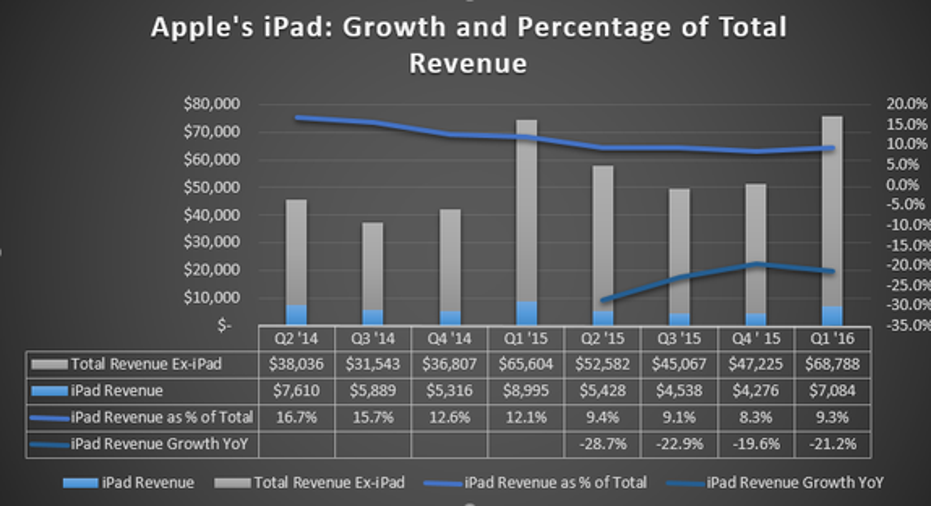Will Microsoft Dominate Apple in High-End Tablets?

IDC's data confirms the brilliance of Microsoft's Surface Pro tag line. Source: Microsoft.
The story of Apple's sluggish iPad sales has been widely covered. After introducing the product to much fanfare in 2010, sales continue to underperform expectations as the combination of a slower refresh period and a shift to lower-cost devices have converged to hit the product's top-line results. Over the past four quarters, Apple has reported greater than 20% year-on-year revenue decreases in three quarters and a drop of 19.6% in the other:
Source: Apple's quarterly reports. Revenue figures in millions.
Recently, research firm IDC updated its forecast for worldwide tablet shipments. Unfortunately for Apple, it appears the market will continue to underperform with IDC expecting a 5.9% year-on-year decline for the overall market. However, there's potentially positive news hidden in IDC's bearish forecast for Apple and a path forward for iPad positioning.
Goodbye, tablets; hello, hybridsIDC actually forecasts positive growth after 2016 in tablets, but not on account of the traditional slate tablet most are familiar with. Instead, IDC estimates that single-digit growth will occur in the product category as a shift toward hybrid tablets, also known as detachables, will increase sales. Additionally, IDC thinks larger form factors (as defined by greater than 9 inches) will grow unit shipments while tablets under 9 inches will experience declines. Simply put, the data is signaling a clear opportunity for Apple's newly introduced 12.9-inch iPad Pro.
So far, Apple's positioned the iPad Pro as mostly a high-end productivity unit for business-focused users. And IDC's data seems to confirm this is correct marketing to present the product as a computer replacement. According to IDC's Jean Phillippe Bouchard, "Everyone in the industry recognizes that traditional personal computers like desktops and notebooks will potentially be replaced by detachables in the coming years." A positive for Apple is consumers are more willing to pay higher prices for detachables when positioned as a laptop replacement:
Microsoft may own this category Apple has its work cut out for it in the detachable, laptop-replacement market. Interestingly enough, IDC points toward Microsoft owning this product category. This year, IDC estimates Microsoft will take 53.3% market share in 2016, growing to 74.6% in 2020. This is important, considering the detachable tablet market is expected to grow 31% annualized through 2020 to 63.8 million tablets that year from 16.6 million in 2015.
What initially looked like a huge mistake for Redmond appears to have been excellent foresight. Under former CEO Steve Ballmer, the company took a near $1 billion writedown for the first-gen Surface RT tablets. IDC's data points toward having current CEO Satya Nadella turn the Surface brand into a success with its current-gen Surface Book and Surface Pro variants. The company wisely positioned the latter as "the tablet that can replace your laptop."
It now appears Apple understands the importance of detachables. Recent rumors are the company will replace the current-gen iPad Air 2 with a 9.7-inch iPad Pro model. Besides size, one of the biggest differences between the iPad Air and current iPad Pro was the Smart Connector interface that allowed the latter to quickly pair with Apple's high-end Smart Keyboard. It stands to reason this technology will be present in Apple's next-gen 9.7-inch model, which will allow it to be positioned as a laptop and PC replacement. Don't count Apple's iPad out just yet.
The article Will Microsoft Dominate Apple in High-End Tablets? originally appeared on Fool.com.
Jamal Carnette owns shares of Apple. The Motley Fool owns shares of and recommends Apple. Try any of our Foolish newsletter services free for 30 days. We Fools may not all hold the same opinions, but we all believe that considering a diverse range of insights makes us better investors. The Motley Fool has a disclosure policy.
Copyright 1995 - 2016 The Motley Fool, LLC. All rights reserved. The Motley Fool has a disclosure policy.



















